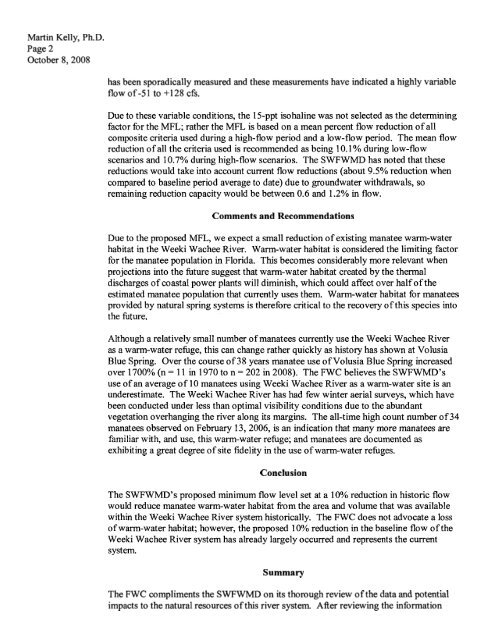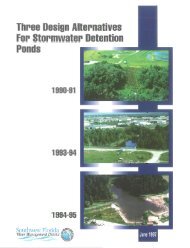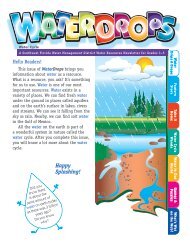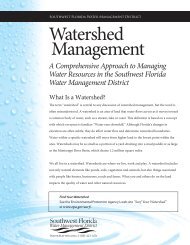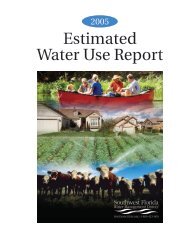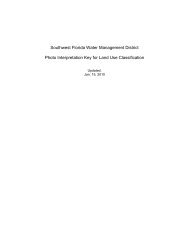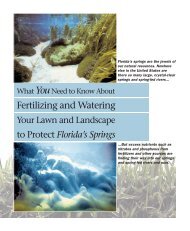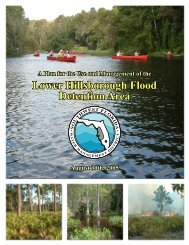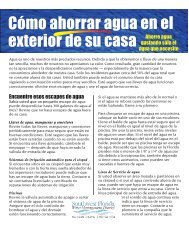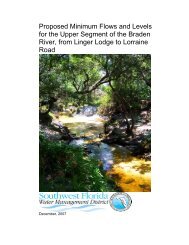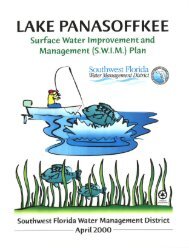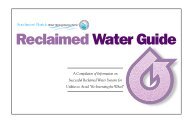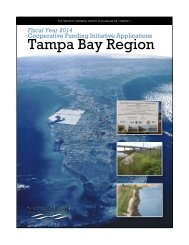Weeki Wachee River System Recommended Minimum Flows and ...
Weeki Wachee River System Recommended Minimum Flows and ...
Weeki Wachee River System Recommended Minimum Flows and ...
Create successful ePaper yourself
Turn your PDF publications into a flip-book with our unique Google optimized e-Paper software.
Martin Kelly, Ph.D.<br />
Page 2<br />
October 8, 2008<br />
has been sporadically measured <strong>and</strong> these measurements have indicated a highly variable<br />
flow of -5 1 to +I28 C~S.<br />
Due to these variable conditions, the 15-ppt isohaline was not selected as the determining<br />
factor for the MFL; rather the MFL is based on a mean percent flow reduction of all<br />
composite criteria used during a high-flow period <strong>and</strong> a low-flow period. The mean flow<br />
reduction of all the criteria used is recommended as being 10.1 % during low-flow<br />
scenarios <strong>and</strong> 10.7% during high-flow scenarios. The SWFWMD has noted that these<br />
reductions would take into account current flow reductions (about 9.5% reduction when<br />
compared to baseline period average to date) due to groundwater withdrawals, so<br />
remaining reduction capacity would be between 0.6 <strong>and</strong> 1.2% in flow.<br />
Comments <strong>and</strong> Recommendations<br />
Due to the proposed MFL, we expect a small reduction of existing manatee warm-water<br />
habitat in the <strong>Weeki</strong> <strong>Wachee</strong> <strong>River</strong>. Warm-water habitat is considered the limiting factor<br />
for the manatee population in Florida. This becomes considerably more relevant when<br />
projections into the future suggest that warm-water habitat created by the thermal<br />
discharges of coastal power plants will diminish, which could affect over half of the<br />
estimated manatee population that currently uses them. Warm-water habitat for manatees<br />
provided by natural spring systems is therefore critical to the recovery of this species into<br />
the future.<br />
Although a relatively small number of manatees currently use the <strong>Weeki</strong> <strong>Wachee</strong> <strong>River</strong><br />
as a warm-water refuge, this can change rather quickly as history has shown at Volusia<br />
Blue Spring. Over the course of 38 years manatee use of Volusia Blue Spring increased<br />
over 1700% (n = 11 in 1970 to n = 202 in 2008). The FWC believes the SWFWMD's<br />
use of an average of 10 manatees using <strong>Weeki</strong> <strong>Wachee</strong> <strong>River</strong> as a warm-water site is an<br />
underestimate. The <strong>Weeki</strong> <strong>Wachee</strong> <strong>River</strong> has had few winter aerial surveys, which have<br />
been conducted under less than optimal visibility conditions due to the abundant<br />
vegetation overhanging the river along its margins. The all-time high count number of 34<br />
manatees observed on February 13,2006, is an indication that many more manatees are<br />
familiar with, <strong>and</strong> use, this warm-water rehge; <strong>and</strong> manatees are documented as<br />
exhibiting a great degree of site fidelity in the use of warm-water rehges.<br />
Conclusion<br />
The SWFWMD's proposed minimum flow level set at a 10% reduction in historic flow<br />
would reduce manatee warm-water habitat fi-om the area <strong>and</strong> volume that was available<br />
within the <strong>Weeki</strong> <strong>Wachee</strong> <strong>River</strong> system historically. The FWC does not advocate a loss<br />
of warm-water habitat; however, the proposed 10% reduction in the baseline flow of the<br />
<strong>Weeki</strong> <strong>Wachee</strong> <strong>River</strong> system has already largely occurred <strong>and</strong> represents the current<br />
system.<br />
Summary<br />
The FWC compliments the SWFWMD on its thorough review of the data <strong>and</strong> potential<br />
impacts to the natural resources of this river system. After reviewing the information


